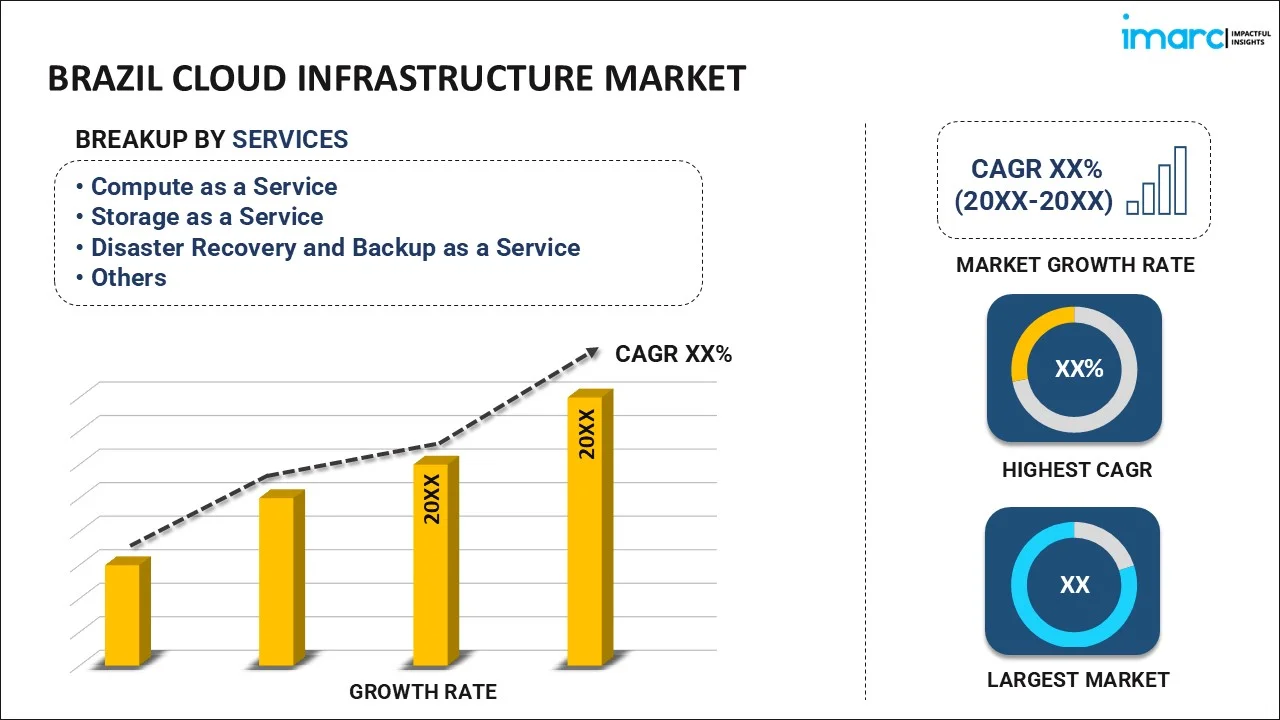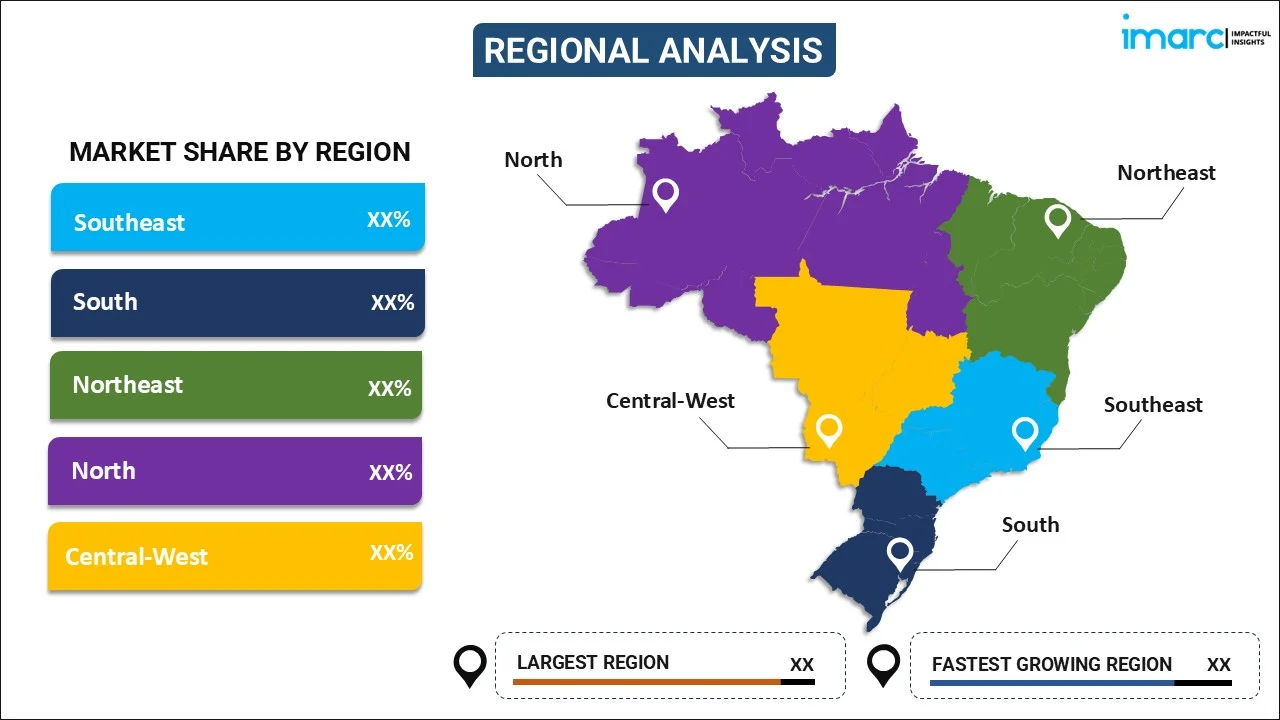
Brazil Cloud Infrastructure Market Size, Share, Trends and Forecast by Service, Deployment Model, Organization Size, Vertical, and Region, 2025-2033
Brazil Cloud Infrastructure Market Overview:
The Brazil cloud infrastructure market size reached USD 1.42 Billion in 2024. Looking forward, IMARC Group expects the market to reach USD 3.81 Billion by 2033, exhibiting a growth rate (CAGR) of 10.70% during 2025-2033. The rapid adoption of cloud-based services, escalating digital transformation, and increasing demand for scalable IT solutions. Additionally, market expansion is supported by the widespread adoption of advanced technologies across various sectors and high investments in data center are some of the major factors propelling the Brazil cloud infrastructure market growth.
|
Report Attribute
|
Key Statistics
|
|---|---|
|
Base Year
|
2024 |
|
Forecast Years
|
2025-2033
|
|
Historical Years
|
2019-2024
|
| Market Size in 2024 | USD 1.42 Billion |
| Market Forecast in 2033 | USD 3.81 Billion |
| Market Growth Rate (2025-2033) | 10.70% |
Brazil Cloud Infrastructure Market Trends:
Heightened Cloud Adoption by Enterprises
Brazil's cloud infrastructure market share is expanding significantly, due to the the heightening adoption of cloud solutions by enterprises across numerous industries. According to industry reports, 64% of Brazilian public entities with IT departments utilize cloud file storage or databases. Similarly, 46% of public and 66% of private healthcare establishments adopt cloud storage. In the healthcare sector, 41% of private facilities use cloud processing, primarily for diagnostic and therapeutic support. Organizations are rapidly inclining from on-premises data centers towards cloud-based infrastructure to lower their costs, improve operational efficiency, and expand resources according to demand. This trend is further accelerated by the magnifying utilization of cloud services, such as platform as a service (PaaS) and infrastructure as a service (IaaS), for maintaining IT workloads. Furthermore, the surge in hybrid cloud strategies is notably gaining momentum as enterprises seek to maintain balance between private and public cloud solutions, providing better control and flexibility over sensitive data, consequently bolstering overall cloud infrastructure investments in the country.
Increasing Investment in Data Centers
The Brazil cloud infrastructure market is witnessing heavy investment in data centers, predominantly driven by the amplifying need for local data processing as well as storage abilities. Leading regional and global cloud service providers are currently extending their data center footprints across the country to address the accelerating demands of both government agencies and businesses. Such investments are also fueled by the implementation of data protection regulations, which demand companies to preserve sensitive data locally. Moreover, the increase in cloud-based applications, digital transformation, and e-commerce is further bolstering the need for high-performance data centers, establishing Brazil as a major regional hub for cloud infrastructure in Latin America. For instance, on September 2024, the government of Rio Grande do Sul and Scala Data Centers signed a letter of intent to develop Brazil's largest and most innovative digital infrastructure project, a "data center city," with an initial investment of USD 500 Million. The project aims to position Brazil as a global AI hub, with the state providing regulatory and governmental support to establish the country's first data center industrial district, which in turn is positively impacting Brazil cloud infrastructure market outlook.
Rapid Adoption of Advanced Cloud Technologies
There is an increasing trend towards adopting advanced cloud technologies in Brazil, such as edge computing, artificial intelligence (AI), and machine learning (ML), within cloud infrastructure. Such technologies are rapidly being incorporated into cloud solutions to automate processes, improve decision-making, and enhance overall performance. Moreover, this significant inclination towards AI-powered cloud systems is aiding the enterprises in leveraging data more efficiently, resultantly driving advancements across various industries such as manufacturing, finance, and healthcare. In addition, edge computing is rapidly gaining traction as it enables faster data processing closer to the source, minimizing latency and enhancing real-time operations. This trend is substantially solidifying Brazil cloud infrastructure market by offering upgraded abilities to address the transforming business requirements. For instance, in September 2024, Microsoft announced a USD 2.70 Billion investment in Brazil over three years to strengthen its cloud infrastructure and AI capabilities. This marks the company's largest single investment in the country, with AI adoption potentially boosting Brazil's economic growth by 4.2% by 2030.
Brazil Cloud Infrastructure Market Segmentation:
IMARC Group provides an analysis of the key trends in each segment of the market, along with forecasts at the country level for 2025-2033. Our report has categorized the market based on service, deployment model, organization size, and vertical.
Service Insights:

- Compute as a Service
- Storage as a Service
- Disaster Recovery and Backup as a Service
- Networking as a Service
- Desktop as a Service
- Managed Hosting
The report has provided a detailed breakup and analysis of the market based on the service. This includes compute as a service, storage as a service, disaster recovery and backup as a service, networking as a service, desktop as a service, and managed hosting.
Deployment Model Insights:
- Public Cloud
- Private Cloud
- Hybrid Cloud
A detailed breakup and analysis of the market based on the deployment mode have also been provided in the report. This includes public cloud, private cloud, and hybrid cloud.
Organization Size Insights:
- Small and Medium Sized Enterprises
- Large Enterprises
A detailed breakup and analysis of the market based on the organization size have also been provided in the report. This includes small and medium sized enterprises, and large enterprises.
Vertical Insights:
- Banking, Financial Services, and Insurance (BFSI)
- IT and Telecommunications
- Government and Public Sector
- Retail and Consumer Goods
- Manufacturing
- Energy and Utilities
- Media and Entertainment
- Healthcare and Life Sciences
- Others
A detailed breakup and analysis of the market based on the vertical have also been provided in the report. This includes Banking, Financial Services, And Insurance (BFSI), IT and telecommunications, government and public sector, retail and consumer goods, manufacturing, energy and utilities, media and entertainment, healthcare and life sciences, and others.
Regional Insights:

- Southeast
- South
- Northeast
- North
- Central-West
The report has also provided a comprehensive analysis of all the major regional markets, which include Southeast, South, Northeast, North, and Central-West.
Competitive Landscape:
The market research report has also provided a comprehensive analysis of the competitive landscape. Competitive analysis such as market structure, key player positioning, top winning strategies, competitive dashboard, and company evaluation quadrant has been covered in the report. Also, detailed profiles of all major companies have been provided.
Brazil Cloud Infrastructure Market News:
- On September 2024, WideLabs, a Brazil-based AI startup, announced a strategic collaboration with Oracle Cloud Infrastructure to refine and train one of Brazil’s largest large language models (LLMs) for its bAIgrapher application, utilized in Alzheimer’s treatment therapy. The WideLabs model leverages OCI AI infrastructure, providing access to a diverse array of OCI Compute instances that offer significant advantages in price-performance and scalability.
- On August 2024, Orca Security, a major cloud security company, officially launched its latest data center in Brazil. This expansion underscores the company’s commitment to the Brazilian market. The new data center is designed to address the increasing demand for cloud security solutions and to provide enhanced support to customers in Brazil.
Brazil Cloud Infrastructure Market Report Coverage:
| Report Features | Details |
|---|---|
| Base Year of the Analysis | 2024 |
| Historical Period | 2019-2024 |
| Forecast Period | 2025-2033 |
| Units | Billion USD |
| Scope of the Report |
Exploration of Historical Trends and Market Outlook, Industry Catalysts and Challenges, Segment-Wise Historical and Future Market Assessment:
|
| Services Covered | Compute as a Service, Storage as a Service, Disaster Recovery and Backup as a Service, Networking as a Service, Desktop as a Service, and Managed Hosting |
| Deployment models Covered | Public Cloud, Private Cloud, Hybrid Cloud |
| Organization sizes Covered | Small and Medium Sized Enterprises, Large Enterprises |
| Verticals Covered | Banking, Financial Services, and Insurance (BFSI), IT and Telecommunications, Government and Public Sector, Retail and Consumer Goods, Manufacturing, Energy and Utilities, Media and Entertainment, Healthcare and Life Sciences, Others |
| Regions Covered | Southeast, South, Northeast, North, and Central-West |
| Customization Scope | 10% Free Customization |
| Post-Sale Analyst Support | 10-12 Weeks |
| Delivery Format | PDF and Excel through Email (We can also provide the editable version of the report in PPT/Word format on special request) |
Key Questions Answered in This Report:
- How has the Brazil cloud infrastructure market performed so far and how will it perform in the coming years?
- What is the breakup of the Brazil cloud infrastructure market on the basis of service?
- What is the breakup of the Brazil cloud infrastructure market on the basis of deployment mode?
- What is the breakup of the Brazil cloud infrastructure market on the basis of organization size?
- What is the breakup of the Brazil cloud infrastructure market on the basis of vertical?
- What are the various stages in the value chain of the Brazil cloud infrastructure market?
- What are the key driving factors and challenges in the Brazil cloud infrastructure market?
- What is the structure of the Brazil cloud infrastructure market and who are the key players?
- What is the degree of competition in the Brazil cloud infrastructure market?
Key Benefits for Stakeholders:
- IMARC’s industry report offers a comprehensive quantitative analysis of various market segments, historical and current market trends, market forecasts, and dynamics of the Brazil cloud infrastructure market from 2019-2033.
- The research report provides the latest information on the market drivers, challenges, and opportunities in the Brazil cloud infrastructure market.
- Porter's five forces analysis assist stakeholders in assessing the impact of new entrants, competitive rivalry, supplier power, buyer power, and the threat of substitution. It helps stakeholders to analyze the level of competition within the Brazil cloud infrastructure industry and its attractiveness.
- Competitive landscape allows stakeholders to understand their competitive environment and provides an insight into the current positions of key players in the market.
Need more help?
- Speak to our experienced analysts for insights on the current market scenarios.
- Include additional segments and countries to customize the report as per your requirement.
- Gain an unparalleled competitive advantage in your domain by understanding how to utilize the report and positively impacting your operations and revenue.
- For further assistance, please connect with our analysts.
 Request Customization
Request Customization
 Speak to an Analyst
Speak to an Analyst
 Request Brochure
Request Brochure
 Inquire Before Buying
Inquire Before Buying




.webp)




.webp)












